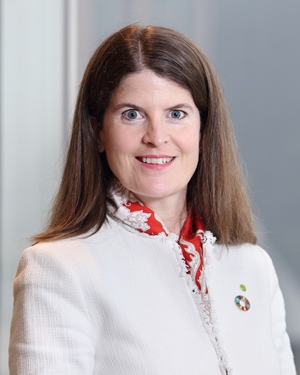As demand for sustainable investment grows, Hong Kong is rising to the challenge of becoming Asia's leading hub for green finance. Supportive policies and access to Mainland China and Belt and Road economies all add to its potential to become a global green investment centre.

Hong Kong has centuries of history as an investment gateway to China for both inbound and outbound investors. Now, with the growing importance of green finance, Hong Kong has become a global connector and trusted advisor for green finance and international investment, not only in the region, but also among Belt and Road economies.
As yet there is no global standard for green finance, so it is not surprising that China-specific standards and international standards differ. China places more emphasis on environmental aspects and is currently working towards mandatory requirements for listed companies to disclose environmental information by 2020. In general, international standards place a greater emphasis on governance and corporate social responsibility.
Global discrepancies in green investment frameworks are clearly on Hong Kong’s and the international financial agendas. In May this year, the Hong Kong Monetary Authority (HKMA) introduced key measures on sustainable banking and green finance to raise banking industry awareness. In September 2018, the Securities and Futures Commission (SFC) announced its strategic framework that provides consistent and comparable disclosures for listed companies in order to promote Hong Kong’s green investment opportunities to international investors.
Meanwhile, the European Commission is also working towards a common taxonomy that defines rules to promote sustainable investment, transparency and disclosure with the aim of having these in place between 2019 and 2022. Additionally, the EU is also in discussions with China to explore ways of aligning their frameworks.
Trusted partnerships
Hannah Routh, Risk Advisory Partner at Deloitte China sees this difference in standards as advantageous for Hong Kong’s development as a green investment hub.

Hannah Routh, Deloitte China
“The great value that I see for Hong Kong is that we understand and cover both standards. If a project developer wants to subscribe to either or both, here in Hong Kong we have the advisors and professional services to help them,” Routh said.
Being able to guide investors and encourage new investment is central to this role. “Sometimes there’s cynicism around what is it really green. In Hong Kong we have good relations with international investors. We can help investors understand the nature of a green project, and how it’s been certified. So this builds trust,” Routh added.
Deloitte views green finance and sustainability as ways that financial institutions and corporates can improve their businesses and enhance long-term profitability. When working with a client, the consultancy focuses on creating sustainable value. Areas it targets include green finance and responsible investment, climate change and carbon, sustainable supply chains and sustainability strategy.
Green finance encompasses projects like renewable energy, waste treatment plants and wind turbines. Environmental, social and governance (ESG) investment can cover any sector. Investors incorporating all three aspects of ESG can reduce or limit exposure to risks.
Deloitte's green finance and ESG investment advisory services include:
• Green bond advice, evaluation, regulatory requirements and issuance
• Green credit advisory (for banks) including evaluation of internal controls
• Climate change physical and transition risk assessment and management
• Environmental and social risk assessment and due diligence
Clients are also able to seek expert advice from specialists in climate change and carbon management. Services include:
• Carbon inventory creation for carbon emissions disclosure, regulatory and sustainability management
• Energy and carbon management including risk analysis of carbon emissions to help clients develop energy savings and emission reduction targets
• Climate policy and low carbon economy advisory
Now and then
Currently, Routh believes there is more money seeking green investment than available products and projects. Opportunities for investment include those onshore in China between local banks and local projects, and also in the Asia-Pacific region from highly liquid European funds.
Green finance and ESG investment were once “nice-to-haves”, rather than a necessity for investors. “10 years ago, these investors were public sector pension funds, those with ethical beliefs or those with very long-term investment horizons. Now it’s gone mainstream,” Routh said. But she cautions there is still some degree of disconnect between the corporate message and the expectations of investment managers.
One example she cites of the change in global investment attitude relates to BlackRock’s Chairman Larry Fink who wrote to all CEOs in companies in which BlackRock invests to underline the importance of ESG. Unfortunately, Routh points out that rigidity, regulations and internal systems mean that ESG policies often don’t trickle down within an organisation, and sometimes investment managers can’t invest in a sustainable project because it may not fit into the constraints of their rigid framework.
“In some cases, internal systems are so rigid that they haven’t caught up with the high-level internal policies that [the corporates] have signed up to,” Routh said.
Changing this bottleneck would require boards and executives who sign up to green initiatives to ensure their boardroom-level decisions trickle downwards, and are understood by those making decisions about investments, via education and training.
Lifting standards
At Deloitte, Routh runs the sustainability and climate change advisory service line, which helps financial institutions and businesses become greener. “We don’t do greenwashing – there's no point – you don’t need a specialist to help do that.”
“We look on behalf of other people, and our assessment criteria will depend on the client who has engaged us. If, for example, we are doing an ESG due diligence, our client might ask us to use the International Finance Corporation’s performance standards, or we might be engaged by a corporate who wants to meet the Global Reporting Initiative's standards.” Many clients who are confused about green frameworks simply seek Deloitte’s advice.
With no globally agreed green finance taxonomy, Routh describes the current attitude to green finance as one that takes a scatter-graph approach. Even data from different ratings agencies may have no correlation, although the data is slowly improving. Mainland Chinese frameworks allow some forms of fossil fuel investment while many international systems don’t allow any fossil fuel-related investment. This discrepancy also underlines an economic difference between the developed economies in Europe and those that are still developing, such as those in the Asia-Pacific region.
This certainly leaves room for Hong Kong to work as an intermediary between both frameworks. “Not everyone has to be 100% aligned. What we’re trying to do is get some cohesion – to improve taxonomy and get more consistency in reporting,” Routh said.


